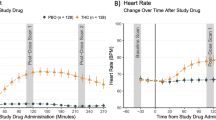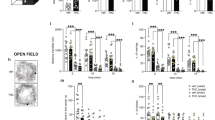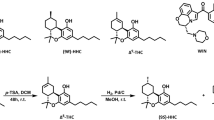Abstract
Previous studies provide evidence that marijuana (Cannabis sativa) and delta-9-tetrahydrocannabinol (Δ9-THC), the major psychoactive ingredient of marijuana, respectively, are effective in the treatment of tics and behavioral problems in Tourette syndrome (TS). It, therefore, has been speculated that the central cannabinoid receptor system might be involved in TS pathology. However, in healthy marijuana users there is an ongoing debate as to whether the use of cannabis causes acute and/or long-term cognitive deficits. In this randomized double-blind placebo-controlled study, we investigated the effect of a treatment with up to 10 mg Δ9-THC over a 6-week period on neuropsychological performance in 24 patients suffering from TS. During medication and immediately as well as 5–6 weeks after withdrawal of Δ9-THC treatment, no detrimental effect was seen on learning curve, interference, recall and recognition of word lists, immediate visual memory span, and divided attention. Measuring immediate verbal memory span, we even found a trend towards a significant improvement during and after treatment. Results from this study corroborate previous data suggesting that in patients suffering from TS, treatment with Δ9-THC causes neither acute nor long-term cognitive deficits. Larger and longer-duration controlled studies are recommended to provide more information on the adverse effect profile of THC in patients suffering from TS.
Similar content being viewed by others

Log in or create a free account to read this content
Gain free access to this article, as well as selected content from this journal and more on nature.com
or
References
Benton AL (1945). A visual retention test for clinical use. Arch Neurol Psychol 59: 273–291.
Block RI, Farinpour R, Braverman K (1992). Acute effects of marijuana on cognition: relationships to chronic effects and smoking techniques. Pharmacol Biochem Behav 43: 907–917.
Buschke H (1973). Selective reminding of analyses of memory and learning. J Verbal Learning Verbal Behav 12: 543–550.
Emrich HM, Leweke FM, Schneider U (1997). Towards a cannabinoid hypothesis of schizophrenia: cognitive impairments due to dysregulation of the endogenous cannabinoid system. Pharmacol Biochem Behav 56: 803–807.
Fletcher JM, Page JB, Francis DJ, Copeland K, Naus MJ, Davis CM et al (1996). Cognitive correlates of long-term cannabis use in Costa Rican men. Arch Gen Psychiatry 53: 1051–1057.
Hall W, Solowij N (1997). Long-term cannabis use and mental health. Br J Psychiatry 171: 107–108.
Hall W, Solowij N (1998). Adverse effects of cannabis. Lancet 14: 1611–1616.
Hall W, Solowij N, Lemon J (1994). The Health and Psychological Consequences of Cannabis Use. National Drug Strategy Monograph Series no 25. Australian Government Publishing Service: Canberra.
Hampson RE, Deadwyler SA (1999). Cannabinoids, hippocampal function and memory. Life Sci 65: 715–723.
Hart CL, van Gorp W, Haney M, Foltin RW, Fischman MW (2001). Effects of acute smoked marijuana on complex cognitive performance. Neuropsychopharmacology 25: 757–765.
Helmstaedter C, Lendt M, Lux S (2001). VLMT—verbaler Lern- und Merkfähigkeitstest. Hogrefe Verlag: Beltz Test GmbH.
Hemming M, Yellowlees PM (1993). Effective treatment of Tourette's syndrome with marijuana. J Psychopharmacol 7: 389–391.
Herkenham M, Lynn AB, Little MD, Johnson MR, Melvin LS, de Costa BR et al (1990). Cannabinoid receptor localization in brain. Proc Natl Acad Sci USA 87: 1932–1936.
Kleiber D, Kovar K-A (1998). Psychische und soziale Konsequenzen des Cannabiskonsums. In: Kleiber D, Kovar K-A (eds). Auswirkungen des Cannabiskonsums: eine Expertise zu pharmakologischen und psychosozialen Konsequenzen. Wissenschaft-liche Verlagsgesellschaft mbH: Stuttgart. pp 88–225.
Leweke M, Kampmann C, Radwan M, Dietrich DE, Johannes S, Emrich HM et al (1998). The effects of tetrahydrocannabinol on the recognition of emotionally charged words: an analysis using event-related brain potentials. Neuropsychobiology 37: 104–111.
Merz J, Lehrl S, Galster JV, Erzigkeit H (1975). MWT-B—ein Intelligenzkurztest. Psychiatr Neurol Med Psychol 27: 423–428.
Müller-Vahl KR (2001). Cannabinoide bei Bewegungsstörungen. Nervenheilkunde 20 (Suppl 3): S72–S73.
Müller-Vahl KR, Koblenz A, Jöbges M, Kolbe H, Emrich HM, Schneider U (2001). Influence of delta-9-tetrahydrocannabinol (Δ9-THC) treatment of Tourette-syndrome on neuropsychological testing. Pharmacopsychiatry 34: 19–24.
Müller-Vahl KR, Kolbe H, Schneider U, Emrich HM (1998). Cannabinoids: possible role in pathophysiology of Gilles de la Tourette-syndrome. Acta Psychiat Scand 98: 502–506.
Müller-Vahl KR, Schneider U, Koblenz A, Jöbges M, Kolbe H, Daldrup T et al (2002). Treatment of Tourette-syndrome with Δ9-tetrahydrocannabinol (THC). Pharmacopsychiatry 35: 57–61.
Müller-Vahl KR, Schneider U, Kolbe H, Emrich HM (1999). Treatment of Tourette-syndrome with delta-9-tetrahydrocannabinol. Am J Psychiatry 156: 395.
Pope Jr HG, Gruber AJ, Hudson JI, Huestis MA, Yurgelun-Todd D (2001). Neuropsychological performance in long-term cannabis users. Arch Gen Psychiatry 58: 909–915.
Pope Jr HG, Yurgelun-Todd D (1996). The residual cognitive effects of heavy marijuana use in college students. JAMA 21: 521–527.
Robertson MM (2000). Tourette syndrome, associated conditions and the complexities of treatment. Brain 123: 425–462.
Sandyk R, Awerbuch G (1988). Marijuana and Tourette's syndrome. J Clin Psychopharmacol 8: 333–335.
Schneider U, Leweke FM, Mueller-Vahl KR, Emrich HM (1998). Cannabinoid/anandamide system and schizophrenia: is there evidence for association? Pharmacopsychiatry 31 (Suppl 2): 110–113.
Singer HS (2000). Current issues in Tourette syndrome. Mov Disord 15: 1051–1063.
Solowij N (1998). Cannabis and Cognitive Functioning. Cambridge University Press: Cambridge.
Solowij N, Grenyer BFS (2001). Langzeiteffekte auf Psyche und Kognition. In: Grotenhermen F (ed). Cannabis und Cannabinoide. Pharmakologie, Toxikologie und therapeutisches Potential. Verlag Hans Huber: Bern. pp 325–338.
Zimmermann P, Fimm B (1992). Testbatterie zur Aufmerksam keits prufung (TAP). Psy text: Wörselew.
Acknowledgements
This study was supported by a grant of the Medical School of Hannover. We thank Dr Wiese for her help with the statistical analysis. Δ9-THC was kindly donated by UNIMED Pharmaceuticals, Inc.
Author information
Authors and Affiliations
Corresponding author
Rights and permissions
About this article
Cite this article
Müller-Vahl, K., Prevedel, H., Theloe, K. et al. Treatment of Tourette Syndrome with Delta-9-Tetrahydrocannabinol (Δ9-THC): No Influence on Neuropsychological Performance. Neuropsychopharmacol 28, 384–388 (2003). https://doi.org/10.1038/sj.npp.1300047
Received:
Revised:
Accepted:
Published:
Issue date:
DOI: https://doi.org/10.1038/sj.npp.1300047
Keywords
This article is cited by
-
Medical cannabinoids: a pharmacology-based systematic review and meta-analysis for all relevant medical indications
BMC Medicine (2022)
-
The effect of medical cannabis on cognitive functions: a systematic review
Systematic Reviews (2022)
-
Randomized controlled trials on the use of cannabis-based medicines in movement disorders: a systematic review
Journal of Neural Transmission (2022)
-
The why behind the high: determinants of neurocognition during acute cannabis exposure
Nature Reviews Neuroscience (2021)
-
Update on the Treatment of Tics in Tourette Syndrome and Other Chronic Tic Disorders
Current Treatment Options in Neurology (2020)


